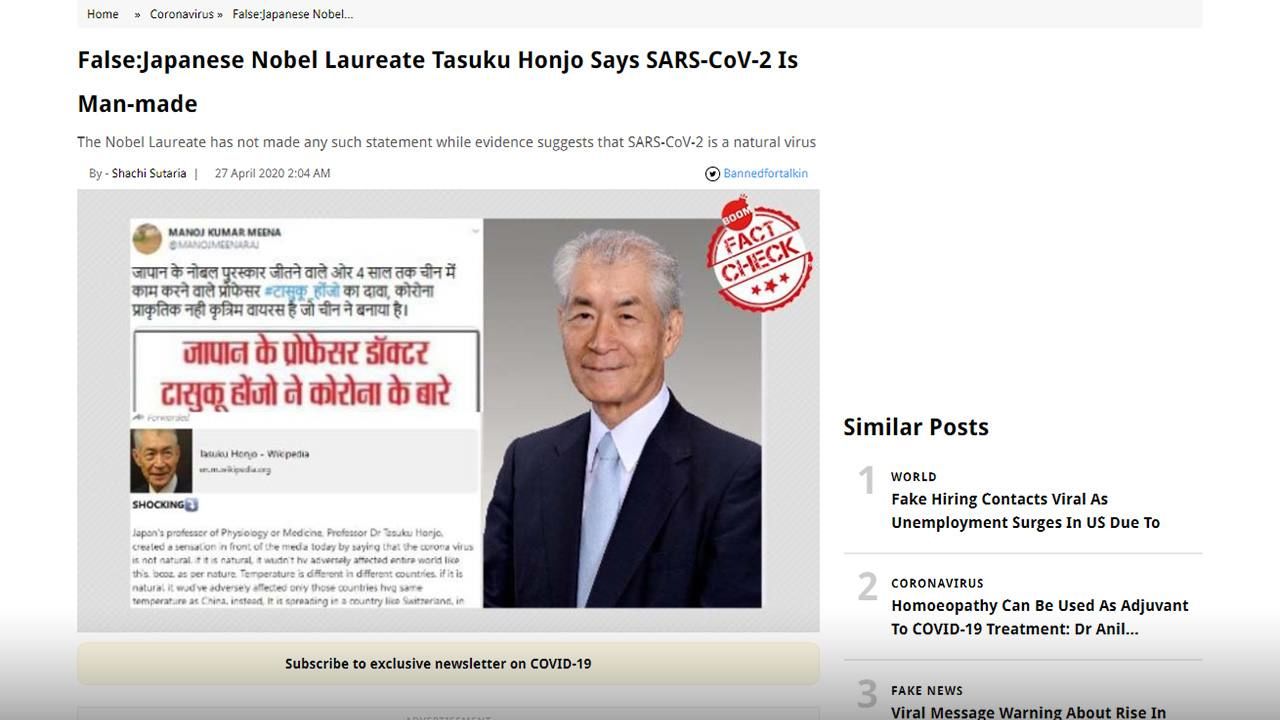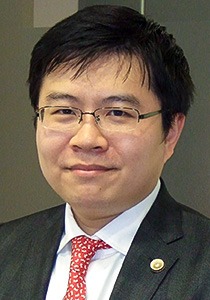
Battling the Coronavirus “Infodemic”: Yanai Hitofumi of FactCheck Initiative Japan
Society- English
- 日本語
- 简体字
- 繁體字
- Français
- Español
- العربية
- Русский
INTERVIEWER Japan faces a deluge of false information related to the coronavirus. The volume is overwhelming at times and has led to the spread of inaccurate medical claims and even panic buying. Have you seen a similar situation in other countries?
YANAI HIROFUMI The COVID-19 pandemic has rattled societies around the globe, creating an environment where misinformation can easily spread. The sheer volume of rumors, allegations, and outright false claims regarding the coronavirus swirling online, particularly on social media platforms, has been described as an “infodemic.”
Medical claims are the most common, such as those professing methods to prevent or treat the virus or reporting a newly developed “miracle” drug. Once unleashed on the Internet, these posts spread like wildfire over social media and through email chains. It doesn’t even seem to matter that the majority of their claims are patently false. The situation is made worse when public figures start pushing half-truths, or worse, outright lies and conspiracy theories. For instance, a leading medical professional and a Nobel laureate in medicine have made comments giving credence to claims that the coronavirus originated in a lab, despite mounting evidence to the contrary.
It’s important to keep in mind that even if a claim seems too ridiculous to be true, it can still have dire social consequences. In England, for instance, a conspiracy theory about the 5G network spreading the coronavirus took off, resulting in incidents like cellphone towers being vandalized and attacks on telecommunication workers.
Japan has also seen its share of wild theories, including claims that health authorities were manipulating the results of PCR tests to hide the number of coronavirus cases. The idea took wing on the Internet after the media pointed out that Japan was testing on a smaller scale compared to other countries. Experts and news commentators then took to the airwaves to discuss the reason for the policy, fanning the online fervor even more.
INTERVIEWER What type of fact checking does FIJ do?
YANAI FIJ looks to protect society from widespread falsehoods by identifying questionable information, objectively checking it, and sharing the results. Rather than scrutinizing the subjective facets of arguments—people’s opinions and the like—we instead focus on investigating the factual basis of claims to uncover false reporting and misinformation in the belief that it raises the credibility of journalism and promotes free and open debate.
We collaborate with and support our media partners in fact checking and publishing accurate information. We also search the Internet for questionable claims and investigate info provided by ordinary citizens. We’ve recently expanded our efforts in response to the COVID-19 pandemic to include projects with fact-checking organizations overseas.
INTERVIEWER How did FIJ begin cooperating with groups abroad and what do you hope to achieve through these partnerships?
YANAI The COVID-19 crisis is borderless. The disease itself, as well as the questionable information and unfounded theories associated with the virus, are fueling social anxiety around the globe. This is a dangerous state of affairs, and by collaborating with fact-checking organization in other countries, FIJ aims to give people everywhere verified information, enabling them to make informed decisions instead of merely reacting to what they hear in the media or read online.
With a grant from the Nippon Foundation, we have expanded our activities to include fact checking in English and Chinese. FIJ is now able to respond to requests from organizations overseas to verify Japanese coronavirus-related information and to check questionable claims originating in other countries before they spread in Japan. As part of these effort, FIJ also runs an English-language site on COVID-19 issues.
To date, FIJ has worked with global partners to verify such information as a controversial tweet purportedly by Defense Minister Kōno Tarō about Taiwan—we were able to prove that the post was a hoax—and to fact check comments by a leading health specialist printed in a Japanese newspaper that were reported out of context in the Hong Kong media. In late April, we also debunked claims spreading online in India that Honjo Tasuku, a Japanese winner of the Nobel Prize for medicine, had stated that the coronavirus was made in a Chinese lab. We then reported our findings in English.
INTERVIEWER How does the international community view the COVID-19 situation in Japan? What’s its assessment of the government’s response?
YANAI Judging from the press coverage of the quarantined cruise ship Diamond Princess and the fate of the 2020 Summer Olympics and Paralympics, interest is quite high. However, since the postponement of the games, focus has shifted to the outbreaks in Europe and the United States.
Medical professionals and other specialists follow stories like the amount of PCR testing Japan is doing, measures being taken to combat the spread of the disease, and the relatively small number of cases and fatalities, but most people are too occupied with the situation in their own country to pay much attention to what is happening here. Debate over the source of the virus is a particularly hot topic, although in Japan you don’t see conspiracy theories being bandied about to the same degree.
INTERVIEWER Considering the sheer scale of information and opinions being shared anonymously on the Internet, particularly on social media platforms, how should groups prioritize fact-checking efforts?
YANAI It’s hard to say, but I think the simple answer is to focus attention on claims that pose the greatest risk to society. Rather than spending resources debunking every dubious statement, no matter how small, priority needs to be on fact checking questionable information that’s likely to incite negative reactions like hatred and discrimination.
As part of this, there needs to be an emphasis on verifying questionable information shared by influential figures on social media and elsewhere. A post from a normal user only reaches a handful of followers, but a single tweet by a prominent individual like a politician or well-known author can spread disinformation across the Internet in a heartbeat. The 5G conspiracy theory, for instance, is thought to have gained traction after a number of top celebrities shared posts on their official accounts.
INTERVIEWER Nippon.com is one of FIJ’s media partners. What role do you see a Japan-focused multilingual web magazine like ours playing?
YANAI The flow of questionable information about the coronavirus will continue, so it’s extremely important that multilingual media sites like yours provide readers around the globe with up-to-date, verifiably accurate information on the pandemic and other issues in Japan. I hope that Nippon.com will also contribute to wider fact-checking efforts.
For more information on FactCheck Initiative Japan, see its website:
(Originally published in Japanese. Banner photo: A screenshot from an article on the website of the Indian fact-checking organization Boom debunking claims falsely attributed to Kyoto University professor Honjo Tasuku.)
